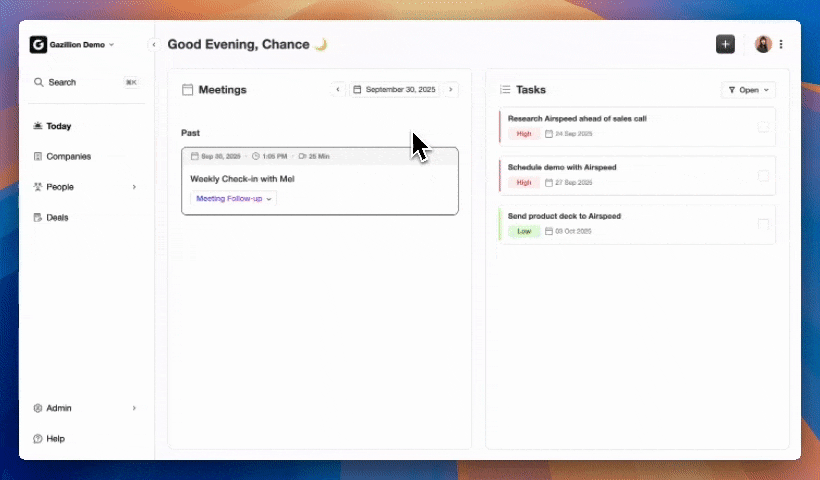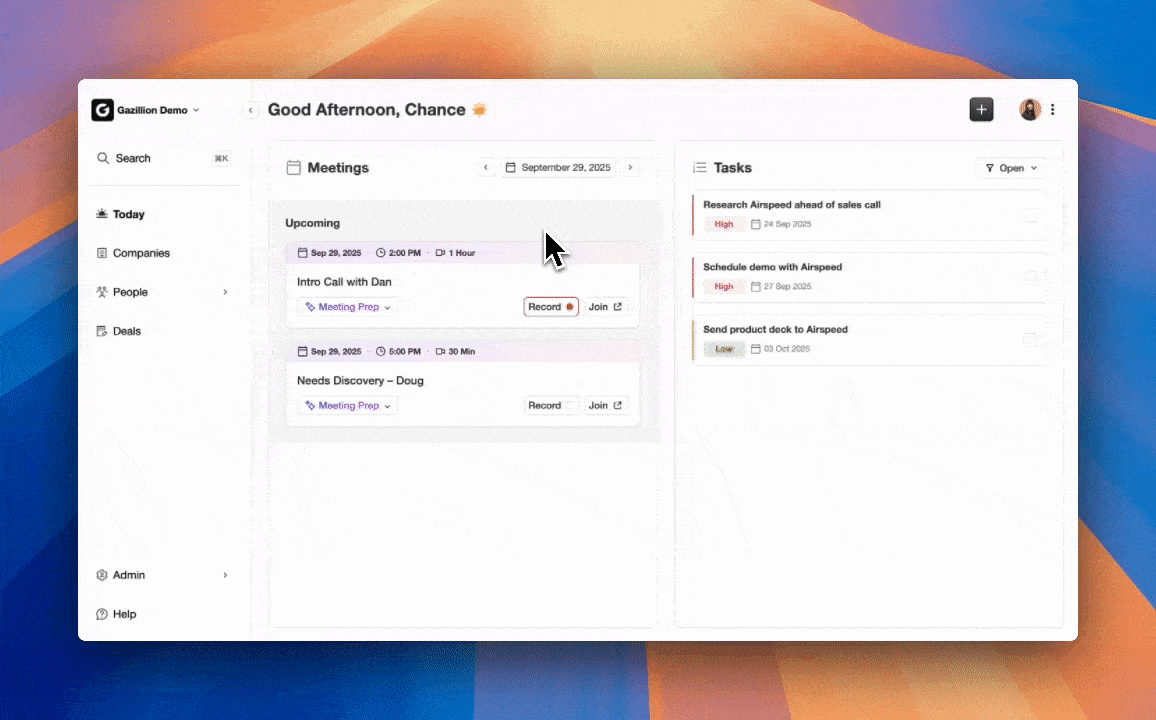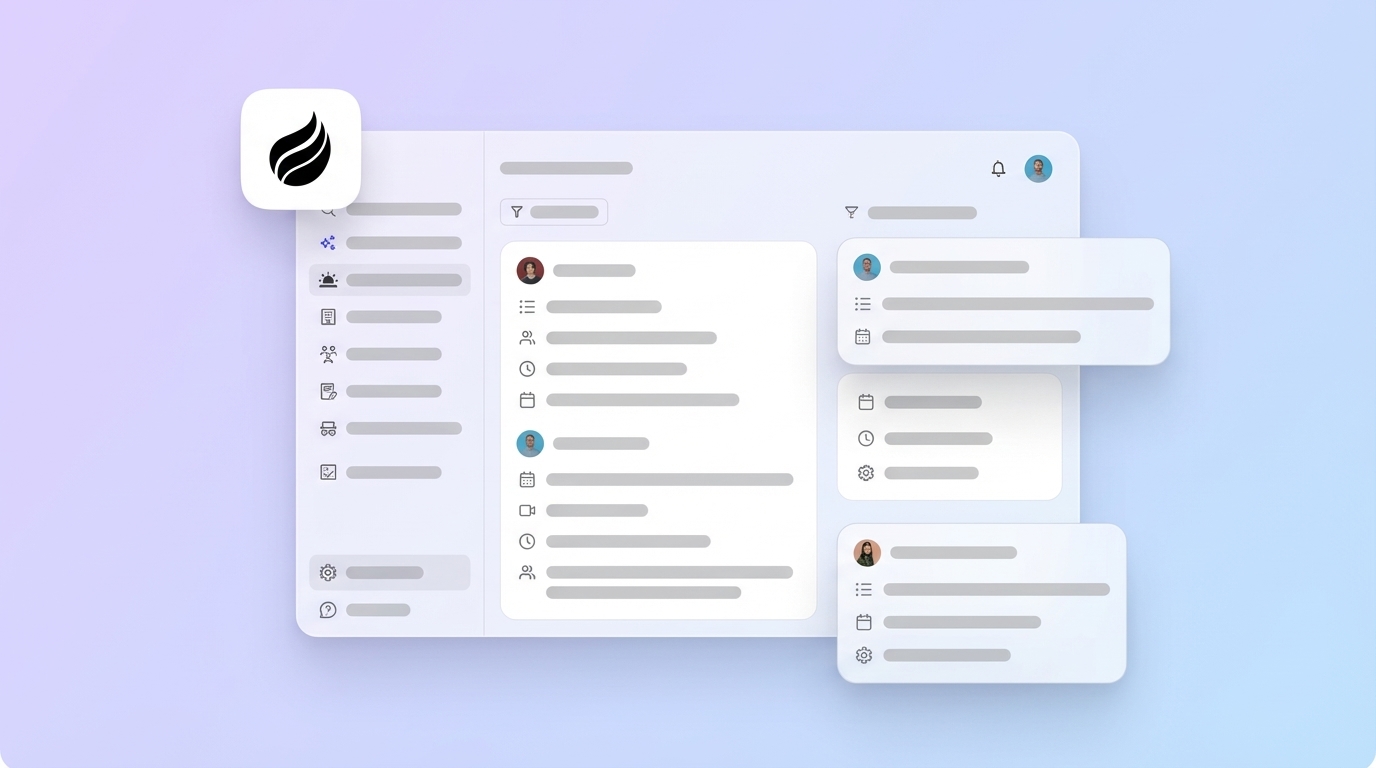Key Takeaways
- Sales enablement works best when it goes beyond content storage and supports reps with timely, relevant information in every buyer interaction.
- Agent-led platforms reduce manual data entry and fragmented workflows, which improves data quality and increases time available for selling.
- Small and mid-market teams gain significant value from modern enablement tools, especially when these tools consolidate multiple point solutions.
- Clear comparisons between agent-led platforms, traditional enablement tools, and legacy CRMs help leaders choose technology that fits current and future needs.
- Coffee offers an agent-led platform that automates admin work, unifies data, and supports meetings and follow‑up. Get started and explore pricing and plans at Coffee.
Why Clear Sales Enablement Matters For Revenue Teams
Sales enablement often falls short because teams treat it as a set of disconnected tools instead of a connected system. With higher revenue targets and longer buying cycles, sales teams cannot afford platforms that rely on manual effort and scattered data.
Traditional CRMs such as Salesforce and HubSpot require significant data entry, which reduces selling time and introduces errors. Agent-led platforms take a different approach. Intelligent agents capture, structure, and unify data across touchpoints so sales enablement shifts from manual upkeep to automated support.
Cut through sales enablement myths and see how Coffee reduces manual data entry for your team.
Top Sales Enablement Platform Myths Debunked For 2026
Myth 1: Sales Enablement Is Just Content Management
Many companies treat sales enablement as file storage, where decks and case studies get uploaded and then forgotten. This approach ignores that effective sales enablement activates content for specific buyers and deal stages, instead of passively housing assets.
Strong enablement programs make sure the right content reaches the right person at the right moment. They connect material to buyer needs, sales stages, and current conversations, so reps always have context for their outreach and meetings.
How Coffee Helps: Coffee uses an agent to prepare meeting briefings before calls and draft tailored follow-up emails afterward. The agent pulls in relevant context from prior interactions, so reps do not dig through folders to find supporting material.

Myth 2: Sales Enablement Is Only For Large Enterprises
The idea that enablement platforms are only for large enterprises often keeps smaller teams from using helpful tools. Agent-led automation supports small and mid-sized sales teams that face manual processes, scattered data, and limited operational capacity.
Growth-focused companies benefit when they replace spreadsheets and disconnected tools with a platform that scales as headcount and pipeline grow.
How Coffee Helps: Coffee offers a standalone AI-first CRM for small teams moving beyond spreadsheets and a companion app for mid-market teams running Salesforce or HubSpot. The agent manages busywork such as logging activities and enriching contacts so teams of any size gain leverage.
Myth 3: You Need Separate Tools For Every Sales Activity
Stacks built on many point solutions often create confusion and low adoption. Teams that rely on multiple tools have higher quota miss rates and higher software waste, while organizations using a centralized platform are more than twice as likely to meet goals.
Reps who switch among tools for records, data, outreach, and call recording face extra cognitive load and duplicate data entry. Each system has its own login and data model, which increases friction.
How Coffee Helps: Coffee consolidates core sales workflows into one agent-led platform. The agent manages CRM updates, contact enrichment, activity logging, and pipeline insights, which reduces software costs and simplifies the daily toolset.

Myth 4: Sales Enablement Is Synonymous With CRM
CRMs store customer data, while sales enablement equips customer-facing teams with tools, content, and insights to sell effectively. Legacy CRMs depend on humans to enter data, which often leads to incomplete records and unreliable reporting.
Market data shared by Coffee shows that 71% of reps feel they spend too much time on data entry. Poor inputs lead to poor outputs, which limit the value of forecasts and dashboards.
How Coffee Helps: Coffee acts as an intelligent agent that supports the principle of good data in and good data out. It captures tasks, syncs data streams, and logs interactions automatically, so leaders gain a more accurate view of the pipeline without extra admin work from reps.
Myth 5: Sales Enablement Is Just Training And Onboarding
Many teams view enablement as a one-time training event. In practice, effective enablement functions as an ongoing, cross-functional program that refines sales processes, not just a library of onboarding materials.
Teams need daily support that adapts to new products, competitors, and buyer behavior. Systems that guide reps in their live workflows tend to outperform static training documentation.
How Coffee Helps: Coffee supports ongoing enablement by automating daily admin work and providing pipeline intelligence. The agent keeps opportunities updated and surfaces context so reps can focus on productive conversations.
Myth 6: Sales Enablement Platforms Are Too Expensive Or Complicated
High perceived cost and complexity often delay investment in enablement platforms. Modern tools emphasize ease of use and clear business outcomes instead of feature overload.
Solutions designed for fast setup and intuitive workflows let teams see value without long projects or heavy training programs.
How Coffee Helps: Coffee uses straightforward seat-based pricing and an agent-led interface that connects quickly to tools such as Google Workspace and Microsoft 365. The agent begins automating tasks like meeting logging and email capture soon after setup.
Myth 7: CRM Content Targeting Fully Replaces Enablement Platforms
CRM content features help to a point, but they rarely match the context-aware search and activation capabilities of dedicated enablement solutions. Rule-based targeting can miss nuance in buyer conversations.
Robust enablement considers conversation topics, buyer stage, and relationship history so reps receive recommendations that align with real-time needs.
How Coffee Helps: Coffee provides AI-supported meeting management and automated summaries. The agent links each interaction to relevant data and actions, which gives reps timely guidance instead of relying only on static CRM rules.
Agent-Led vs Traditional Solutions: A Practical Comparison
Agent-led platforms mark a shift from passive systems that wait for manual input to active systems that manage routine tasks for reps. This difference changes how teams experience sales enablement in day-to-day work.

|
Feature |
Coffee (Agent-Led Platform) |
Traditional Sales Enablement Platform |
Purpose-Built CRM (Salesforce or HubSpot) |
|
Data entry and quality |
Agent creates and enriches contacts and activities automatically to keep data complete |
Relies on manual updates, which creates inconsistent data quality |
Heavily manual data entry that often remains partial or outdated |
|
Workflow automation |
Agent prepares briefings, summaries, and follow-ups for meetings with minimal setup |
Offers tools for automation, but often needs complex configuration |
Primarily a database with limited native automation |
|
Data unification |
Agent unifies structured data with emails and call transcripts into a single view |
Focuses on content organization more than unstructured data |
Information is fragmented across multiple tools and systems |
|
User experience for reps |
Acts as a co-pilot that reduces admin work and earns rep trust |
Often feels like an extra task, which lowers adoption |
Frequently viewed as a reporting requirement rather than a daily helper |
Review Coffee pricing and see how an agent-led platform changes daily sales workflows for your team.
Conclusion: Debunk Sales Enablement Myths And Improve Revenue With Coffee
Misunderstandings about sales enablement platforms often keep teams from tools that can improve performance. When leaders distinguish between passive software and active agents, they can replace fragmented workflows and manual data entry with coordinated automation.
Coffee’s agent-led platform addresses common pain points by consolidating the tech stack, improving data quality through automated capture, and supporting teams from early-stage companies through mid-market organizations. Reps gain a practical co-pilot that fits into daily work.
The future of sales enablement in 2026 favors intelligent agents that manage busywork so humans can focus on relationships and deals. Explore Coffee pricing and start testing an agent-led approach for your sales organization.
Frequently Asked Questions: Sales Enablement Platform
What is the biggest challenge with sales enablement platforms today?
The main challenge is reliance on fragmented, passive tools that demand constant manual updates. This creates low adoption and poor data quality. Agent-led platforms address this by automating repetitive tasks so the system supports selling instead of adding extra work.
How do modern sales enablement platforms maintain good data quality?
Modern agent-led platforms ingest and structure data from email, calendars, and call transcripts automatically. Consistent capture and enrichment improve accuracy, which leads to more reliable reporting and insights.
Can a sales enablement platform consolidate our sales tech stack?
An integrated agent-led platform can replace multiple point tools. By handling CRM updates, enrichment, meeting intelligence, and pipeline analysis, a single platform simplifies workflows and reduces software spend.
What kind of ROI can a sales enablement platform deliver?
The right platform increases efficiency by reducing time spent on admin tasks. Reps can gain 8 to 12 hours per week previously used on manual data entry, which increases time available for prospecting, follow-up, and closing.
How does an agent-led platform differ from traditional sales enablement tools?
Agent-led platforms perform work on behalf of reps instead of waiting for configuration and manual input. Intelligent agents capture data, coordinate workflows, and surface insights in context, which creates a more supportive experience than static feature sets.
